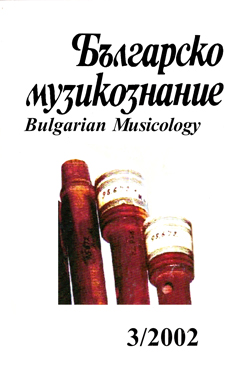Шок от настоящето
Shock from the Present
Author(s): Svetlana ZaharievaSubject(s): Music
Published by: Институт за изследване на изкуствата, Българска академия на науките
Summary/Abstract: The wording of the title is analogous with the well-known work of the American sociologist Alvin Tofiler ‘Shock from the Future”. The shock from the future (according to Tofiler) is loss of orientation in the rapidly changing contemporary world and the increasingly accelerating historical period of time, it is impossibility to envisage future actions and results. The shock from the present, on the other hand, arises from the concrete clash with various manifestations of the changing world, which are incomprehensible for the individual because they are not in conformity with the accepted norms, values and stereotypes. The most abrupt and profound changes occur during the change of the types of societies - the traditional agrarian society was replaced by the industrial, which in its tum, in the middle of XX c., gave way to the information society. The end of XIX c. was the boundary between the traditional and hierarchically aristocratic social system and the new industrial society. This end was endured very painfully, with uncertainty and fear for the future, which found expression in the concept “fin du siecle”. The transition from the traditional to the industrial society was connected with the appearance of the modem national state and national ideology. In the attitude to the folklore heritage from the past and the occurring transformations in the musical life, the features of the shock from the present, its rationalization and adaptation to the new conditions of life and the elaboration of adaptation strategies for its preservation, its rationalization as a musical sign of national identity and as a field for new musical theoretical discoveries, particularly in the area of uneven dimensions, are quite evident. In his study “Significance and task of our ethnography” (1889) our distinguished scholar and public figure Ivan Shishmanov, shocked by the invasion of foreign music of mediocre quality, replacing the traditional song of the past, developed broad adaptation strategy for preserving folklore by collecting, documenting, studying and popularizing it. The musicians collecting folklore faced the problem of writing down in notes the song which is foreign to the West European theoretical system in sound pitch and metro-rhythmic tune. Two problems arose from here: the first problem arose in a conflict with foreign recorders (mostly Serbs), who unwillingly or deliberately deform the genuine sounding through inexact notation aiming at its cultural annexing. For over two decades there was controversy between our folklorists (Karel Mahan, Dobri Hristov, Vassil Stoin) and Serbian folklorists concerning the Bulgarian national belonging of our traditional music . The second problem proceeded from the first one - the necessity for exact metro-rhythmic recording of the characteristic Bulgarian uneven dimensions led to the elaboration by Dobri Hristov, Vassil Stoin and later Stoian Djudjev of a consistent theory about the uneven dimensions in Bulgarian..
Journal: Българско музикознание
- Issue Year: 2002
- Issue No: 3
- Page Range: 115-146
- Page Count: 32
- Content File-PDF

